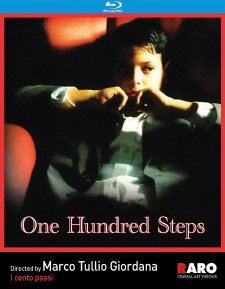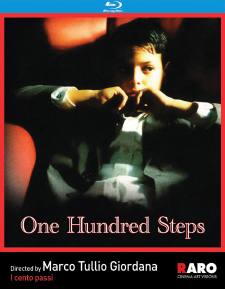One Hundred Steps (Blu-ray Review)

Director
Marco Tullio GiordanaRelease Date(s)
2000 (December 27, 2022)Studio(s)
Titti Film (Raro Video)- Film/Program Grade: B+
- Video Grade: A-
- Audio Grade: A-
- Extras Grade: B-
Review
A biographical drama from Italy, One Hundred Steps (I cento passi, 2000) has a rather ordinary, straightforward screenplay and direction to match, much like one expects from biopics made-for-cable/streaming in the U.S. However, the film’s very existence is itself unusual. It tells the story of Peppino Impastato (1948-78), a young, left-wing activist who very publicly denounced the Sicilian Mafia in his hometown during the 1970s and, perhaps inevitably, was murdered. The murder was underreported at the time, as it happened on the very same day former Italian Prime Minister Aldo Moro’s body was discovered following a long, nationally televised kidnapping ordeal. Impastato’s death was at first considered accidental (a terrorist attack by him gone wrong), then a suicide. The true story gradually unfolded in the 20 years following his death.
Made in cooperation with Impastato’s surviving family members, it is the antithesis of films like The Godfather (1972), which glamorized and even empathized with such ruthless criminals; that film’s runaway success led to scads of imitators. In Italy, however, its “poliziotteschi” (Italian crime films), while acknowledging the violence and political upheaval of Italy’s “anni di piombo” (“years of lead”), preferred neo-fascist, left-wing extremist, and vigilante villains rather than antagonists with even the slightest hint of being members of organized crime. Indeed, one of the fascinating aspects of One Hundred Steps is how the Mafia were hiding in plain sight: people cowered in fear from an organization that consistently denied its very existence.
So while as drama One Hundred Steps is pretty unexceptional, its recreation of life in Sicily in the 1960s and 1970s, in an environment completely dominated by the Mafia and the perpetual fear of violent reprisals among submissive residents, captures myriad fascinating little details, much of which will be new to American viewers.
The filme opens with Impastato a small boy in Cinisi, a provincial town in Palermo where his much-loved uncle, Cesare Manzella, is the local Don. When Cesare is murdered in a car-bombing, Impastato is confused—who’d would want to murder him, and why? His mother, Felicia (Lucia Sardo) feigns ignorance. Impastato assumes Italian communists, convenient agitators blamed for many of Italy’s problems, but when he visits local painter Stefano Venuti (Andrea Tidona), hoping to have his uncle’s portrait painted as a memorial, he learns Venuti is himself an outspoken communist who matter-of-factly identifies the real murderer, family friend “Tano” Badalamenti (Tony Spearandeo), Cesare’s ambitious successor.
As a young man (now played by Luigi Lo Cascio), Impastato joins the Communist Party but is quickly disillusioned by their cautious inaction, especially after the local communist newspaper refuses to publish an article Impastato has written titled La Mafia è una montagna di merda (The Mafia Is a Piece of Shit). Undeterred, he self-publishes the piece, creating a rift with his father, Luigi (Luigi Maria Burruano), owner of a local pizzeria indebted to Badalamenti and terrified of what the response might be to his son’s outspokenness. Father and son become estranged, though his mother secretly maintains her relationship with the young rebel.
Unable to find distribution for his writings, Impastato takes to the airwaves with Radio Aut, a mix of music and scathing satirical political commentary that upsets not only Badalamenti, but also the mayor and local police, government officials in the Don’s pocket. There is much apparent humor in these broadcasts that doesn’t quite “travel,” just as Robin Williams’s radio schtick in Good Morning, Vietnam likely left Italian audiences bemused, even with subtitles.
Dramatically, One Hundred Steps is pretty standard, a dramatic recreation of historical events, with the acting, direction, cinematography (by Roberto Forza and Stefano Paradiso) and so forth all professionally done but unremarkable. Conversely, the undercurrent of tension in many scenes, similar to Martin Scorsese’s GoodFellas, is very interesting. When, for instance, Luigi is summoned by Badalamenti after Impastato’s early radio broadcasts, he knows he’s in deep trouble; while being escorted there, he sheepishly asks one of Badalamenti’s soldiers, “Be honest with me—is this bad?” hoping to emotionally prepare himself in case the Don is planning on murdering him.
Luigi himself has reason to fear Badalamenti; he knows that, per Mafia tradition, before they can snuff out Impastato they’re obliged to first kill his father. During the intriguing opening scenes, a family gathering to celebrate a new marriage, Uncle Cesare is treated like the family patriarch, yet there’s still a varying reluctance on the part of others there to do or say anything that might cross him. Some view Badalamenti, Cesare’s successor, as a very approachable, reasonable man, though actor Spearandeo doesn’t play him with any visible warmth. Yet when he or members of his organization turn up at funerals “paying their respects” to people Badalamenti himself ordered murdered, the awkwardness is palpable.
One very odd aspect of the film, which in turn makes it resemble something for television all the more, is its curious total absence of graphic violence. There are three onscreen murders yet nary a drop of blood is shown. Maybe this almost G-rated restraint was out of consideration for Impastato’s family, but it works against the film’s verisimilitude. It’s strange to see a film about Mafia violence that’s less graphic than your average Daffy Duck cartoon. When the car bomb goes off near the beginning of the film, the explosion is seen from a distance, and doesn’t really look like a car exploding. When the real Cesare Manzella was murdered, a huge crater was formed and pieces of his body were found stuck in the branches of lemon trees half a mile away.
In the leading role, Luigi Lo Cascio is fine, though especially in scenes where he elfishly plots to embarrass the Mafia, he has a rather uncanny resemblance to British actor Alan Cumming that, for me at least, was a bit of distraction, though he does also resemble the real Impastato. Luigi Maria Burruano, as his father, delivers the really standout performance of the film, playing a man torn between love of his son and wanting to protect him yet unable to control his boy’s admirable but self-destructive behavior.
Raro Video’s Blu-ray, released through Kino Lorber, is Region-Free. The 1080p hi-def presentation is in 1.85:1 widescreen, and the video transfer is up to contemporary standards for a title of this age. Color, sharpness, contrast, etc. are all good, and the Italian DTS-HD Master Audio (2.0 stereo) is acceptable, though not particularly aggressive. The optional English subtitles are fine.
The only extra is an audio commentary track with actor-writer-journalist Andrea Purgatori, who helpfully puts the film and its subject into context.
Not great cinema, particularly, but engrossing nonetheless, One Hundred Steps is familiar subject matter presented in an unfamiliar manner, and recommended.
- Stuart Galbraith IV

